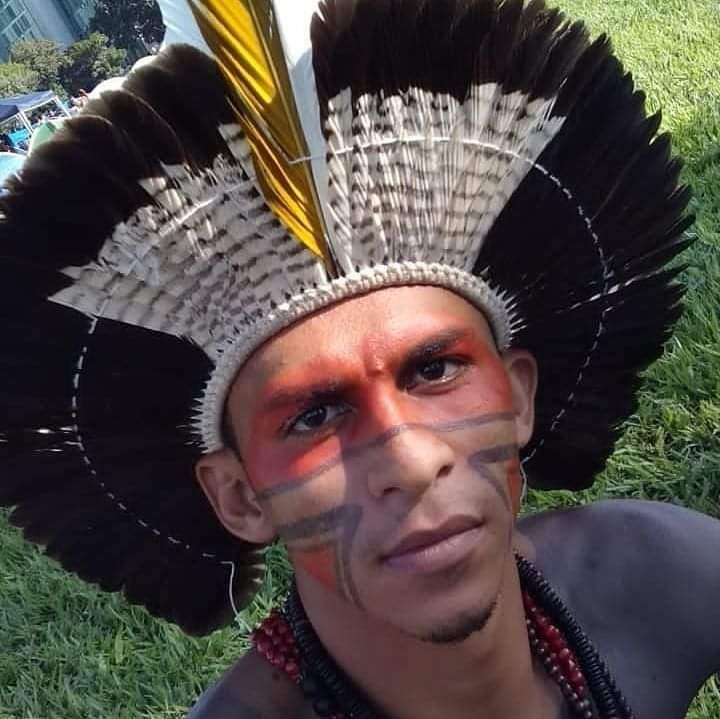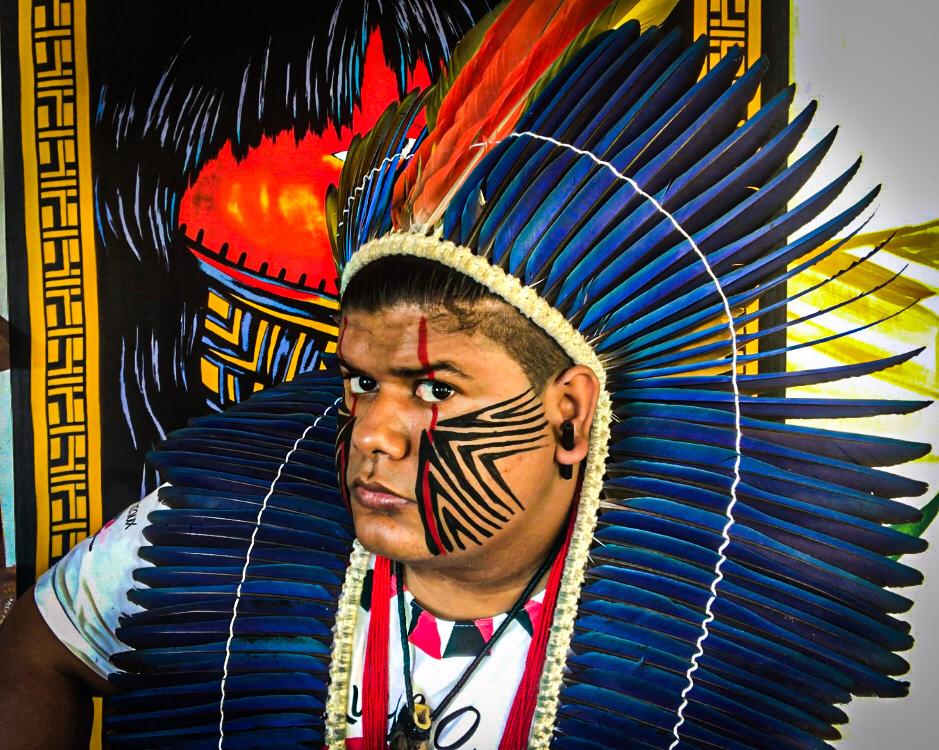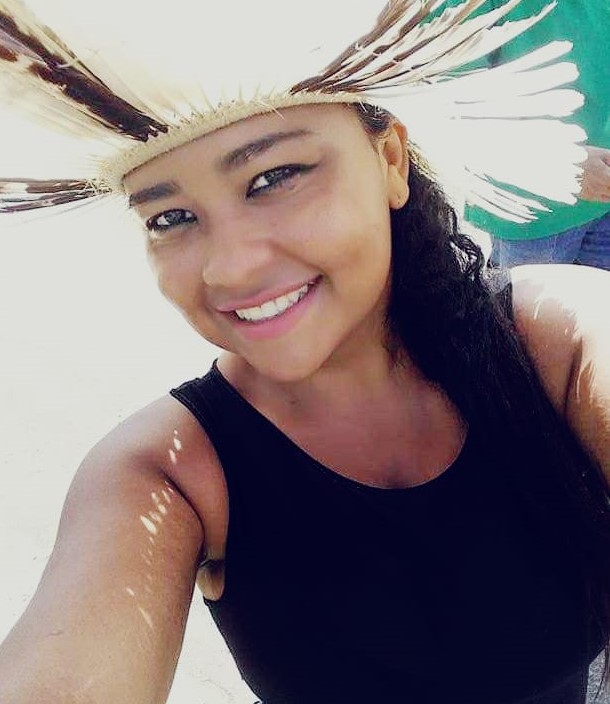Researcher: Daniela Alves de Araújo
Interviewee: Madson Pitaguary

Date: 21/09/2020
This study is being conducted by Indigenous students from the Federal University at Recôncavo Bahia (UFRB), together with Indigenous students from the Federal University at Bahia (UFBA) and from the Bahia State University (Uneb), in partnership with the University of Sussex in England. It is part of the Mapping Indigenous Rights Abuses in Northeast Brazil project. The main objective is to discover how the Indigenous populations of Ceará have been doing during the new coronavirus pandemic, focusing on the preventive measures adopted by the villages, the number of cases and the main impacts on the communities. This interview was conducted in an exchange of WhatsApp text messages.
1. What is your name?
Madson Vieira da Silva.
2. How old are you? 25.
3. What people and village are you from?
Pitaguary, from Maracanaú (Ceará state).
4. Were there any Covid-19 cases in your village?
Yes.
5. What safety protocols did the village adopt?
Social isolation, use and distribution of masks, and distribution of gel alcohol.
6. How was it for you, as an Indigenous person, to live through this very difficult moment?
For me, it was quite complicated, both in terms of isolation and mask use. I believe it was like this for everybody, because all of this was new, we had never been through a pandemic. Even though the government decrees are for everyone, many people don’t respect the isolation and prevention measures for Covid-19.
7. Were you affected in any way? If so, what were the principal impacts?
Yes, I was. The impact was in relation to work, we had to innovate and work remotely.
8. Did you lose a relative or someone you know to Covid-19?
Yes, I lost a friend. I believe everyone saw or heard about the case of Mr. Francisco Pitaguary, a tronco velho [an elder with many descendants] and university student, who was approved in the same admission exam as me (the selection for the Universidade da Integração Internacional da Lusofonia Afro-Brasileira (Unilab)) [University for International Integration of Afro-Brazilian Lusophony].
9. This question of school, how is it going? And the university?
We are working in accordance with guidelines from the Regional Coordinator of Educational Development (CREDE), using various tools such as: WhatsApp, Google Forms, Google Classroom, YouTube, etc. The university is also operating remotely, using Google Meet.
10. Regarding village rituals, did you stop completely? How is that going?
In terms of rituals, the toré was held twice, only in the village of Monguba. Whereas regarding umbanda, I don’t know how many times it happened.
Researcher: Daniela Alves de Araújo
Interviewee: José Benicio Silva Nascimento
Date: 07/09/2020

José Benício Silva Nascimento, known as Benício Pitaguary, is 27 and an Indigenous member of the Pitaguary, from the Monguba village, in the municipality of Pacatuba, in Ceará state. He is a geography graduate from Ceará Federal University (UFC), a youth leader of the Pitaguary, and a communicator at the Museu Indígena Pitaguary (MIP) [Pitaguary Indigenous Museum]. Benício is a presenter at Mídia Índia and is on the Ceará State Cultural Council, and a member of Ceará’s Indigenous Cultural Policy Management Committee. He is an artist, a specialist in Indigenous graphics, and conducts a number of activities related to this theme, such as giving talks and workshops in Indigenous villages and universities, in Brazil and abroad. Benício said that there were positive cases of Covid-19 in his community. To raise awareness, from the outset, the community established its own lockdown, barring visits of non-Indigenous persons to the area and sanitizing residents’ cars. They launched a campaign to produce masks and collect basic food packages for families who had their income affected. They also established a campaign to raise awareness about hygiene and social distancing. The situation has been very worrisome for him, because it is so new and atypical. Benício graduated from the university very recently and had plans to pursue a master’s degree overseas; because of the pandemic, he will have to wait. “I was going to do my master’s degree in Spain, now I will have to wait for the next application process.” He also said that he was very worried about the more elderly leaders, considered the village’s “living books”. According to Benício, every member of the village was affected, because, in addition to alterations in their traditional programs, studies and projects were also postponed. Craft sales, which were an important income source for the community, are now only taking place online. With this new reality, Indigenous peoples had to adjust themselves to technology. Benício concluded the interview saying that he had lost some friends to Covid-19, but no relatives.
Questionnaire:
- What is your name?
- How old are you?
- Who are your people? What is your village and municipality?
- In your village, were there any cases of Covid-19?
- What safety protocols did the village adopt?
- How was it for you, an Indigenous person, to live through this very difficult moment?
- Were you affected in any way? If so, what were the main impacts?
- Did you lose a relative or someone you know to Covid-19?
- In your community, how have rituals been practiced?
- For you, who work painting and selling handicrafts, how has this period been?
- Considering the fact that you just graduated and had many plans to return to the village, how is it experiencing all these changes?
Answers:
- José Benício Silva Nascimento.
- 27 years old.
- Pitaguary people, from the village of Monguba, in the municipality of Pacatuba, Ceará state.
- Yes.
- From the start we established our own lockdown, barring visits of non-Indigenous people to the area and sanitizing the residents’ cars. We initiated a campaign to produce masks and collect basic food packages for families whose income had been affected, and also started a campaign to raise awareness about hygiene and social distancing.
- It’s very worrisome, because it’s a very new and atypical situation. I was really worried about our older leaders, who are our ‘living books’.
- Certainly, we were all affected. In addition to alterations in the people’s traditional programs, we also had studies and projects postponed.
- I lost some friends, but not close relatives.
- We aren’t performing our rituals not even toré.
- Sales of paintings and handicrafts have declined; they are only happening online.
- Everything changed. I was going to do my master’s in Spain, now I have to wait for the next application process.
Interviewee: Edmaria Braga da Silva
Date: 08/09/2020

Edmaria Braga Oliveira[MOU1] , 27, is an Indigenous member of the Pitaguary, from the Central village, in the municipality of Maracanaú, in Ceará state. She was one of those in her community who was infected with Covid-19. It was a very difficult period for her, because, in addition to being in a risk group, because of hypertension, she was worried that members of her family would contract the virus from her. As child, she had asthma, when she caught the virus, the asthma returned, and now she has to use medication and an inhaler to be able to breathe properly. She also said that she has lost people she knows to Covid-19. Edmaria works as a food handler at the Pitaguary’s Indigenous Municipal School of K-12 Education. She relates that “classes are suspended, but the employees are completing their schedules in uninterrupted stretches, with fewer hours.” According to her, in terms of the school’s functioning, there haven’t been any difficulties, because the mayor’s office of the municipality, in conjunction with the school’s administration, has left nothing wanting in terms of salary and awareness raising. Everyone is taking the appropriate measures, using masks and gel alcohol. In her community, one of the means used to raise the population’s awareness and prevention against Covid-19 was the distribution of hygiene supplies (gel alcohol and masks) and food kits for families who had their income affected.
Questionnaire:
- What is your name?
- How old are you?
- Who are your people? What is your village and municipality?
- In your village, were there any cases of Covid-19?
- What safety protocols did the village adopt?
- How was it for you, an Indigenous person, to live through this very difficult moment?
- Were you affected in any way? If so, what were the main impacts?
- Did you lose a relative or someone you know to Covid-19?
- . How is the pandemic in the school where you work?
Responses via text message:
- Edmaria Braga Oliveira.
- I am 27.
- I am Pitaguary, from the Central village, in the municipality of Maracanaú, Ceará state.
- Yes.
- Awareness raising and distribution of hygiene kits and masks.
- I contracted Covid-19 and it was a very difficult time, because, in addition to being in a risk group, because of my high blood pressure, I was also afraid that members of my family might catch the virus from me.
- Yes, what affected me most was that, as a child I had asthma, and, when I caught the virus, the asthma returned. Now I have to use inhalers to breathe correctly.
- I lost people I know.
- I prepare food at the Indigenous Municipal School of the Pitaguary. Classes are suspended, but employees are completing their schedules in uninterrupted stretches (with fewer hours). In terms of functionality, there aren’t any difficulties, because the mayor’s office of the municipality, in conjunction with the school administration where I work, has left nothing wanting, in terms of salary and awareness raising. There have also been distributions of hygiene supplies, like gel alcohol, masks and food kits.
Interviewee: José Leandro Vieira de Lima
Date: 08/09/2020

José Leandro Vieira de Lima is 21[MOU1] , a youth leader of the Pitaguary and lives in the village of Monguba, in the municipality of Pacatuba (Ceará state). Leandro was one of those in his community infected with Covid-19, with symptoms such as fever, lack of appetite and headaches. He took the Covid-19 test at his village’s health clinic. Leandro recounts that his greatest fear was infecting members of his own family who are in a risk group. He also relates that he suffered prejudice from one portion of the community. His village has employed, as a way of raising Covid-19 awareness and prevention, the use of masks and gel alcohol. The entry of outsiders to community leisure areas is prohibited. Getting through this pandemic has been a very difficult experience for him. Leandro says that he is not sure how many cases of Covid-19 occurred in his village, and that he did not lose any relatives due to the pandemic.
Questionnaire:
- What is your name?
- How old are you?
- Who are your people? What is your village and municipality?
- In your village, were there any cases of Covid-19?
- What safety protocols did the village adopt?
- How was it for you, an Indigenous person, to live through this very difficult moment?
- Were you affected in any way? If so, what were the main impacts?
- Did you lose a relative or someone you know to Covid-19?
Responses via text message:
- José Leandro Vieira de Lima.
- I am 21 years old.
- I am Pitaguary, from the Monguba village, in the municipality of Pacatuba (Ceará state).
- Yes, I don’t know for sure how many.
- Mask use and barring the entry of outsiders into our leisure areas.
- It has been a very difficult experience.
- Yes, the fear of going out and infecting a family member who is in a risk group.
- No.